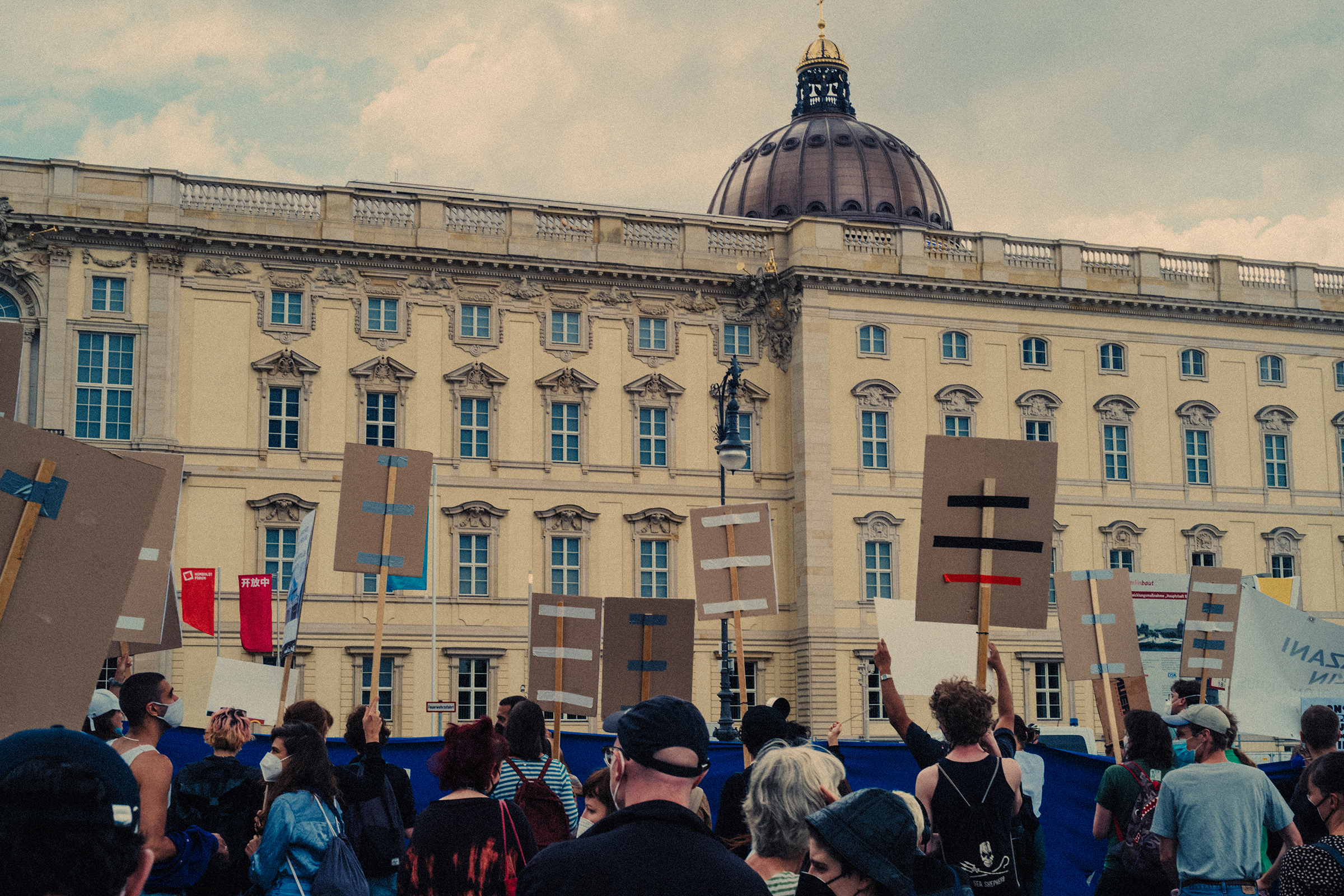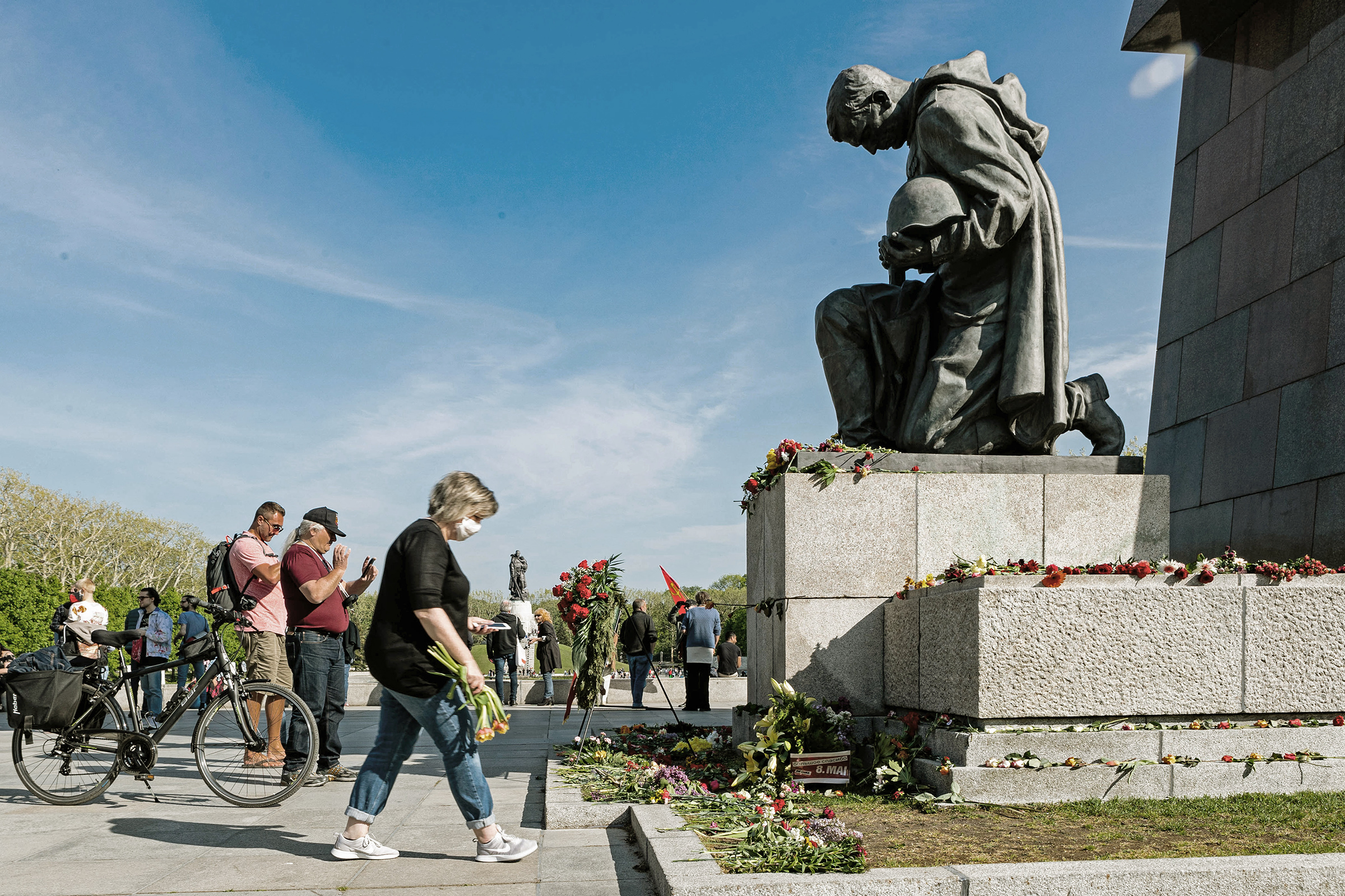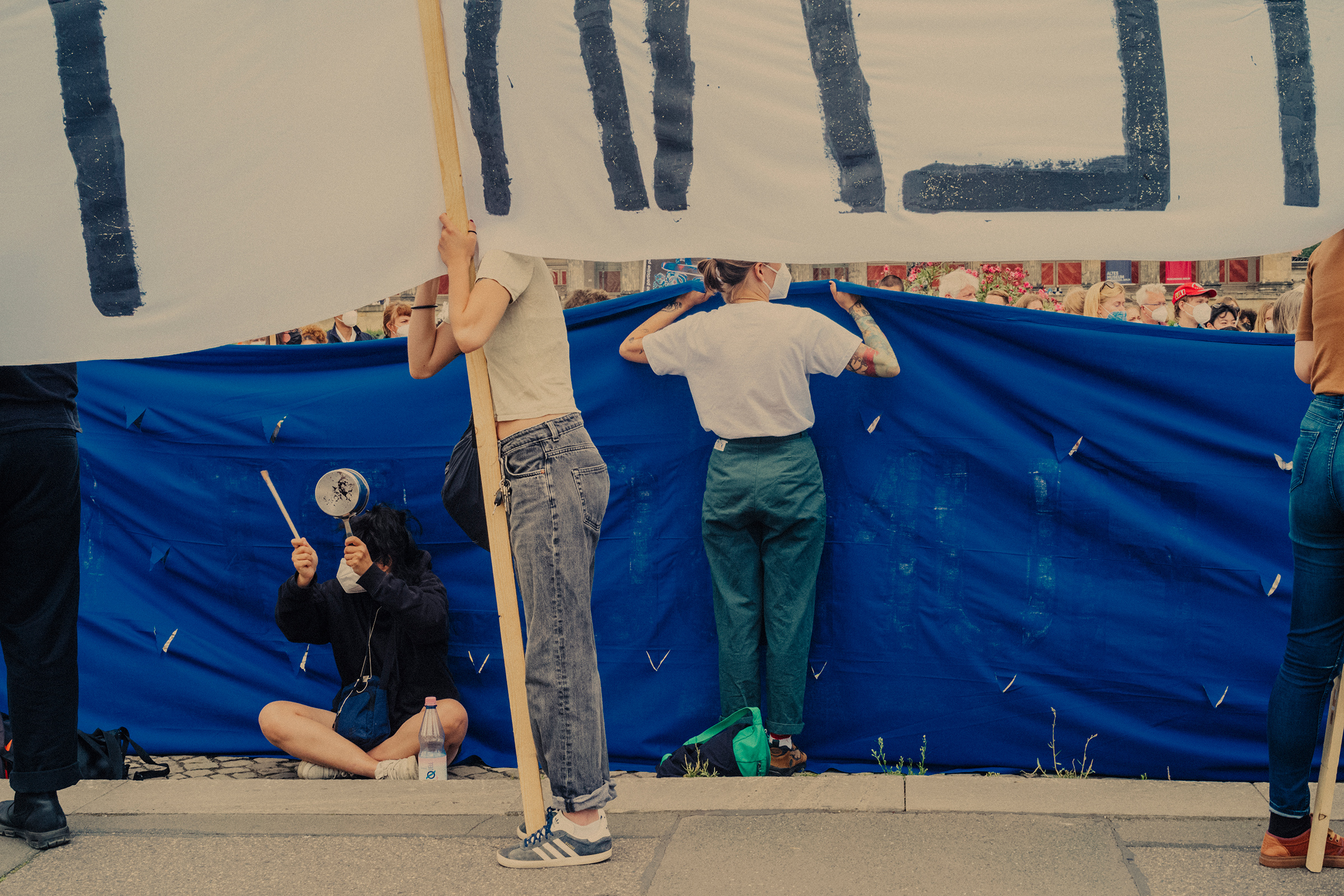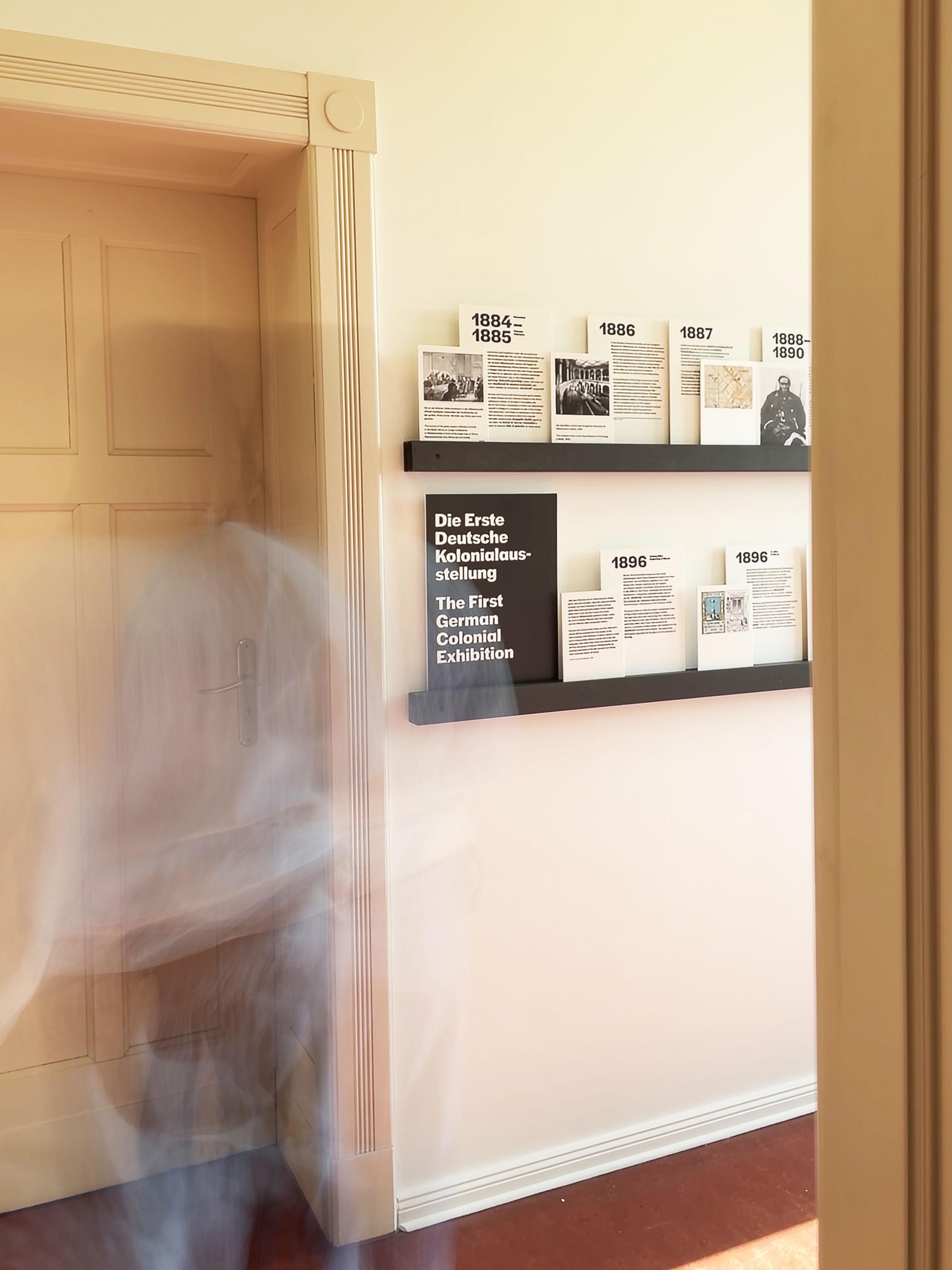
Nestled alongside the River Spree south of Berlin’s city center, Treptower Park is home to green lawns, riverboat rides and runners pounding their way along the waterside path. Summer days usually see sunbathers enjoying the views of the leafy landscape, or tourists in awe of the Soviet War Memorial’s commanding centerpiece: a 12-meter tall statue of a Soviet soldier, built in the park in 1949 built in the park in 1949 in remembrance of the 80,000 Red Army soldiers who died during World War II’s Battle of Berlin, about 7,000 of whom were buried in the park.
The memorial is one of several physical reminders of Germany’s 20th century history in public spaces throughout the city, among them Checkpoint Charlie, the Brandenburg Gate and the Holocaust Memorial. Now, a group of activists, artists and educators known as Dekoloniale is working to draw attention to another part of the country’s past: its dark history of colonialism, starting with the story of Treptower Park itself. Home to the first German Colonial Exhibition of 1896, the park became the setting for reconstructions of villages of Germany’s overseas colonies across the African continent. Not only were these model villages on display—so were 106 people from these communities, unwilling and unwitting participants who were uprooted from their homes and “exhibited” for audiences in Berlin.
Now, 125 years on, the members of Dekoloniale are commemorating the inhabitants of the Colonial Exhibition’s villages through a new permanent exhibition at Treptow Museum, detailing their lives and their forms of resistance against oppression. After the pandemic forced a digital launch last November on the anniversary of the Berlin Conference, the new exhibition at Treptow and an accompanying program of events including a city-wide tour of sites with overlooked imperial history recently marked the first physical events Dekoloniale has hosted. “It’s really about implementing a new form of remembrance culture, and also showing people in a very physical way how present that past is, and how much it still shapes the present,” says journalist and curator Nadja Ofuatey-Alazard, one of Dekoloniale’s directors.
She’s speaking not just about the new exhibition, which opened on Oct. 15, but the overall work of Dekoloniale—which launched last year and will continue through 2024, constituting perhaps the most ambitious such initiative to date to promote understanding of a European capital city’s colonial history. Made up of a coalition of Berlin-based organizations already working to promote postcolonial knowledge and racial justice activism, Dekoloniale is making colonial history comprehensible through a new interactive mapping tool examining sites with imperial history, working with museums on policies around exhibitions and artifacts, and launching festivals and art exhibitions in public spaces with the intention of confronting German colonialism and its legacy.
With a €2 million ($2.3 million) investment from the Senate Department for Culture and Europe, and €1 million ($1.2 million) from Germany’s Federal Cultural Foundation, the group has ambitious plans to interrogate the city’s painful history and legacy of imperialism and racism, and forge a way forward for its future. “These calls are there because [the past] has been ignored for so long,” says Anna Yeboah, Dekoloniale’s project coordinator. “Germany is no longer in the position where it can ignore what’s happening internationally.”
Linking the past to the present

Last June, an estimated 15,000 people attended anti-racism protests in Berlin’s city center after the killing of George Floyd in the U.S. Ofuatey-Alazard, who is also the CEO of Each One Teach One, an education and empowerment project based in Berlin working with Black families and communities, says her organization was inundated with interview requests throughout the summer of 2020. Ofuatey-Alazard leads Dekoloniale’s In[ter]ventions strand of projects, which focuses on arts and festivals that critically and creatively examine colonial history. She points out that these conversations have been built on years of activist work, highlighting that this history and contemporary racism has often been denied. “There have been people on the ground in Berlin and Germany who have been fighting these fights and addressing these issues for decades,” she says.
Among some, including Dekoloniale’s organizers, there’s a sense that Germany has made excuses for its relatively short overseas colonial empire project compared to other European nations. Germany’s 19th century empire-building ramped up after the 1884 Berlin Conference, spanning parts of East, West and central Africa including present-day Burundi, Rwanda, Namibia and Tanzania. But all its overseas colonies, including those in the Pacific and in China, were confiscated at the end of World War I. While comparatively short, the violence the German Empire perpetrated was brutal, and left deep scars of trauma for African and Black diaspora communities which continue to be felt today. Historians have also noted that Germany’s colonial-era atrocities, which included extermination campaigns, concentration camps and mass violence, were predecessors to forms of abuses the Nazis enacted under Hitler during the Holocaust.
“You’ve got this resistance against taking on responsibility for it, for example, like in the discussions concerning the genocide in Namibia,” says historian Christian Kopp, who founded Berlin Postkolonial e.V, one of Dekoloniale’s project partners. Kopp and his colleagues organize walking tours around the city to bring colonial history to people through explaining architecture and street names, and he is the project lead for Dekoloniale’s [Hi]stories strand, which involves the mapping project. He also points to efforts to rename and reclaim German public spaces as positive steps fueled by civil society groups such as his own and others involved in the Dekoloniale project. Last year, for example, a Berlin street named after a racist phrase was retitled Anton Wilhelm Amo Strasse after Germany’s first African-born scholar. Yet even those initiatives, he says, have faced pushback from some historians and conservative media commentary.
Dekoloniale too has not been insulated from backlash, and not only through newspaper columns. The group’s offices, located on Berlin’s major thoroughfare of Wilhelmstrasse, have been targeted several times with racist slurs and messages on its windows. “People want to tell us they know what we are doing and that they are watching us,” says Kopp, adding that Black activists and colleagues, including those leading guided tours throughout the city, are reporting an increasing number of physical and verbal attacks. “Though there is progress, the resistance against this progress is getting more violent.”
Through their work, Dekoloniale’s project leaders are keen to draw the link between these painful histories and present injustices. “To an extent, the government does not want to create a link between the Imperial history of violence and the racism happening on the ground,” says Ofuatey-Alazard. Reports of racist incidents and discrimination in Germany have been on the uptick in recent years. The most recent report by Germany’s Federal Anti-Discrimination Agency disclosed that in 2020, the agency had received 2,101 enquiries regarding discrimination on racist grounds or the basis of ethnicity, representing a year-on-year increase of almost 79 percent, a larger increase than in the previous four years combined.
‘Cracking open perceptions’

In May, the German government formally recognized its colonial-era atrocities against the Herero and Nama people in modern-day Namibia for the first time, calling the massacres of an estimated 70,000 people a “genocide,” but stopped short of a full and unequivocal apology. The agreement between the two governments was applauded within Germany, but denounced by Herero and Nama chiefs, who were not included in the final negotiations.
Elevating those voices in their work—even, and especially, when government officials fail to do so— is part of Dekoloniale’s goal. As part of In[ter]ventions, women artists hailing from Zambia, Ghana, Nigeria and Cologne were invited to a residency in Berlin over the summer to create work prompted by colonial history; these works will be unveiled as part of the October programming. It’s one of the ways in which Dekoloniale’s project leaders want to collaborate with activists, academics, thinkers and artists of African descent, and especially those from former German colonial sites. Those transnational links matter a great deal, as Ofuatey-Alazard says she “absolutely demands and wishes for” a center in the city of Berlin that deals with colonial histories and repercussions, with related centers in the former German colonies, to research these legacies and impacts.
Voices from the diaspora are also featured in their online mapping project and walking tours, led by Kopp. On Dekoloniale’s website, a series of videos presented by local community members, experts and activists explore the history behind certain sites, including the Deutsche Bank building, now the Federal Ministry of Health. In the video, Berlin-based Herero activist Israel Kaunatjike explains the bank financing of a key railway line in present-day Namibia, and how it played a role in the genocide.
The map serves as a guide to upcoming events, a living archive of events past, and an interactive experience, showing the connections between the movement of people, ideas, objects. “The map is a platform that renders visible everything that we do,” says Ofuatey-Alazard, pointing to the map’s construction, which, unlike most maps, does not position Europe at its center. “We are playing with people’s brains and emotions, because we want them to unlearn certain ways that are automated, crack open certain perceptions and lay open structures of violence and history.”
In a similar way, the exhibition at Treptow is not ‘completed’—part of the exhibition space is open and empty, to provide room for more collaboration, research and different interpretations of history. “This is an active part of making the memory culture and one that is rooted in the present, not only in the past,” says Yeboah. It’s quite a departure from affairs at the controversial and beleaguered Humboldt Forum; a major museum in the heart of Berlin that was the site of protests upon its opening in July this year. The major cultural destination has received criticism for its approach to displaying colonial-era artifacts, and for Yeboah, that backlash is a sign that grassroots work and public pressure can “change the discourse very rapidly,” she says. “I think I have not read even one positive article on the Humboldt Forum, not even in the conservative press.”
By the mapping project’s end in 2024, Dekoloniale hopes to have launched around 150 walking tours to showcase more hidden histories, with at least half of these stories representing those of resistance. “What’s happening a lot is that if German people are covering colonialism, they focus on the violence and the violators,” says Yeboah. “The resistance part is much more interesting, and tells us a lot more about what we need to know now to tackle these current problems.”
Momentum beyond Berlin

Debates over how to interrogate the past, ranging from proposals to change school curricula to include teaching on race and empire to resurgent scrutiny on restitution of looted objects, have taken on a renewed energy since June 2020 in several countries across western Europe. In one example with parallels to Treptower Park, activists in Madrid are calling for a recently UNESCO-designated World Heritage Site in the city to properly acknowledge its history as a human zoo. “The things that we are talking about, I think they are happening in every city, in very different ways,” said Ofuatey-Alazard in November 2020, just after Dekoloniale’s digital launch. She was right: take the example of London, where a summer of Black Lives Matter protests had swept across the U.K., toppling statues of slave traders in their wake as conversations around the nation’s dark history galvanised mainstream attention.
In the same week that German’s Foreign Ministry issued a statement regarding Namibia, French President Emmanuel Macron acknowledged France’s “overwhelming responsibility” in the 1994 Rwandan genocide, yet also did not offer a full apology. And in the U.K., imperial history itself has become a lightning rod for political debate, with resistance to fair and nuanced interrogation largely coming from the right-wing press and government, including Prime Minister Boris Johnson, who claimed in October that British history and cultural heritage is at risk of “cancel culture iconoclasm.” But that doesn’t mean demand from society to learn about the past isn’t there: in June, the U.K. Parliament debated a petition signed by more than 268,000 people to include British colonial history as part of compulsory school curriculums, and grassroots campaigns continue to call for change.
Dekoloniale hopes that other fellow European cities might take note of their work, and commit to an investment—there are already conversations around a potential similar initiative in Munich. “Among young people particularly, there’s a greater interest in understanding the deep roots of this, because some of them are truly disgusted and do not want to be part of systems like this. And so I think there is an eagerness to really comprehend it,” says Ofuatey-Alazard. Groups like the one she, Yeboah and Kopp are part of are coming together to address decolonization meaningfully—not as a fad or trend or buzzword of the moment. “It’s about righting some wrongs, and giving access and space to many more voices. It’s just the appropriate thing to do and the necessary thing to do.”
Correction, Oct. 25
The original version of this story mischaracterized the intention of a World War II memorial in Berlin’s Treptower Park. It was built in remembrance of 80,000 Soviet soldiers who died in the Battle of Berlin, and the 7,000 buried in the park.
More Must-Reads from TIME
- Where Trump 2.0 Will Differ From 1.0
- How Elon Musk Became a Kingmaker
- The Power—And Limits—of Peer Support
- The 100 Must-Read Books of 2024
- Column: If Optimism Feels Ridiculous Now, Try Hope
- The Future of Climate Action Is Trade Policy
- FX’s Say Nothing Is the Must-Watch Political Thriller of 2024
- Merle Bombardieri Is Helping People Make the Baby Decision
Contact us at [email protected]